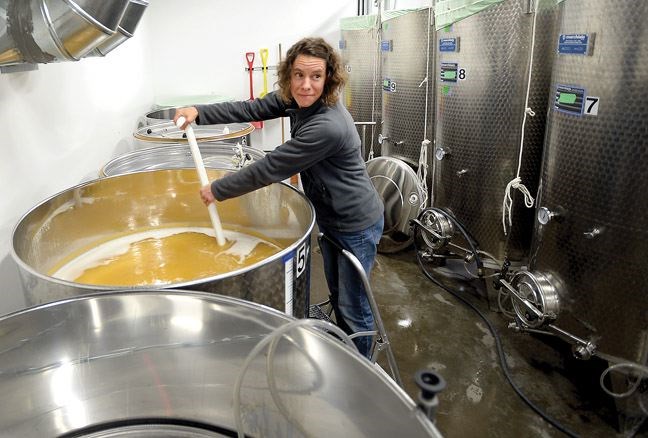Sure you can hold your booze, but conservationists and vintners in Prince George want you to also be able to bear your wine.
Northern Lights Estate Winery, one of the city's newest businesses, and the most northerly winery in Canada, is doing something to save the lives of local bears: they are making wine. It hardly seems like an innovation, on the surface, but here's the cutting edge of the new service they provided: they made this special wine out of apples that would normally have fallen on the ground or over-ripened on the tree, thus turning into a deadly attractant for hungry bears.
Bears that habituate to garbage - and over-ripe fruit is just their sort of garbage - get shot. Often, if it is a sow, the babies have to be shot, then too. All because someone couldn't be bothered to look after their backyard fruit.
This year, the winery contacted the city's Northern Bear Awareness Society and stuck a deal. The manufacturing plant pledged to take all the apples the society's Fruit Exchange Program could gather up, blend them, and make a sweet fruit wine.
The donations of apples came rolling in. The community got behind this practical use for unwanted apples, and contributed about 5,000 pounds of them. More than 20 varieties showed up in the mix.
"We took everything. We like to use apple blends," said winery proprietor Doug Bell. "Some of these varieties may not be good eating apples, but they are very good when made into wine."
The Bear Aware Program volunteers went to houses that called to offer their fruit and picked the majority of the donated fruit, but more than 1,000 pounds of the stuff was brought to the winery by the apple owners themselves.
"We have seen what the public's reaction was, and this was just the first go at this. I think we may be able to double or even triple our intake in the next few years, which will help even more to reduce these attractants, and that reduces the bear-human interactions and it will reduce the number of bears that have to be killed," Bell said.
The unwanted apples-into-wine scenario also had another major benefit. Since Northern Lights estimated the intake of fruit would result in about 300 cases of wine, they turned the proceeds of that agri-food product into even more bear hugs. This week, even before the wine was out of the vats and into the bottles, they made a cash donation of $2,500 to the Northern Bear Awareness Society.
Society president Dave Bakker was gobsmacked.
"With this money, we can pay off two years of our phone operation costs and two years of the insurance we must have to do our work. Those are two of our biggest fixed expenses," he said. "This is a real boost for us. It frees us up to direct money into better operations. A good reason for doing that is making an even bigger Fruit Exchange Program, because Doug is right, I think this is just the beginning of what we can do to collect that unwanted fruit. We can't take it to the regional district's compost site, it all has to go into the landfill, so now it has a real purpose and people responded well to that."
There are many other attractants that cause the needless death of bears at the hands of conservation officers tasked to protect the public from habituated bruins.
These include things like unclean barbecues, unkempt bird feeder areas, and the worst of course is insecure trash cans. Some extra money for the society means focus can be put on all these topics.
"Destroying animals who are just being themselves is not the solution," Bakker said. "We must address the issue of attractants head-on, because there are no second chances or three strikes for these bears. If a bear is getting into backyard fruit or your garbage can, they have to be killed. Period. That is just sickening when you think of how unnecessary that is."
Underneath all this respect for nature, conservation philosophies, and public safety concern, is another sip of good news from Northern Lights. Their first year was so successful, they have sold out almost all of their bottles. There is more in the fermentation stage now - 11 of their 14 fermentation tanks are full at the moment - and the apples will help boost the stock on their shelves, but the operation is getting set for a shutdown period in which they will concentrate on cleanup, marketing strategy, business development, and other preparations for year two. Bell said the public interest in what they are making on the shores of the Nechako, at the base of the cutbanks, has been nothing short of stunning. They have sold almost 15,000 bottles this rookie season.
"We have been getting major interest from Kitimat, Terrace, Prince Rupert, Smithers, and we have had to say no to a lot of them because we are still in our startup stages and we are still concentrated on the Prince George market. But we feel like already we are considered northern B.C.'s winery," he said.
"Demand has exceeded expectations, absolutely. Originally we were feeling like we could produce 1,500 cases per year, but when we felt the initial response from the public and from within the industry, we expanded those plans to 5,000 cases per year. Well, in this first year, where we were just getting on our feet, we have sold more than 1,200 cases, we have a sense of what the demand is in reality, so we are already looking over the numbers and seeing if an expansion is maybe a good idea already. We may need to build some more facilities. It's not because we did something extraordinary outside of our original business plan, it's because northern B.C.'s response has been so extraordinary. That is really exciting."



